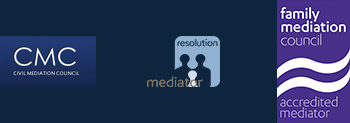During the traumatic times that inevitably accompany the end of a relationship, it is very easy for the adults involved to forget that they are not alone in facing significant upheaval and change. Children are also very much affected by divorce and breakup, and family mediation can help everyone to keep in mind that what is important is what is best for the child, not what might be best for the parents. Around a quarter of children will have lived through their parents divorce or separation by the time they reach the age of 18.
We often see people who are angry, upset, sad, resentful or confused – or all of these things – and there is a temptation to put the needs of the adults first. The children are also suffering. They will be going through a very difficult time as one of the cornerstones of their lives is suddenly taken away, leading to feelings of deep unhappiness and insecurity. In family mediation we try to mitigate those feelings as best we can, recognising that a lot is going to change, but that the children need to be reassured that their parents do not love them any less.
Mary Lund, in a study published in 1984, identified three approaches to parenting through divorce and separation. The first was what she called the cooperative co-parenting family. These parents recognise the effect that their separation has had or will have on their children, and work together to minimise that impact. They recognise that separation does not mean the end of parental responsibility for either parent, and they try to put aside their difficulties and differences when considering decisions affecting the children, such as what school they are to attend. Sometimes they struggle to do so, but they recognise the importance of this and often work with the mediator in family mediation to maximise their cooperation and minimise the impact on their children.
The second group she called conflicted two parent families. In such families both parents are still involved with the children, which is as it should be, but they are unable to cooperate. They will seek rigidity of rules and neither will do anything to make the other’s lot any easier. They often try to recruit the children to their ‘side’ and will often come to family mediation talking about their rights. At Hampshire Mediation we firmly believe that the discussion is not really about rights – it is about the responsibilities that they have to their children, and we work with them in family mediation to identify what those responsibilities might be, and how they are best met.
The third group are what Lund called absent-parent families. There may be many reasons why one or other parent is absent from his or her child’s life, but in all but the most extreme cases, that absence is not in the child’s interests. In family mediation we work with parents to arrive at a solution that allows the children to have access to both their parents unless there is a good reason why that should not be so.
It is, after all, the welfare of the children that should be at the heart of any family mediation session.


